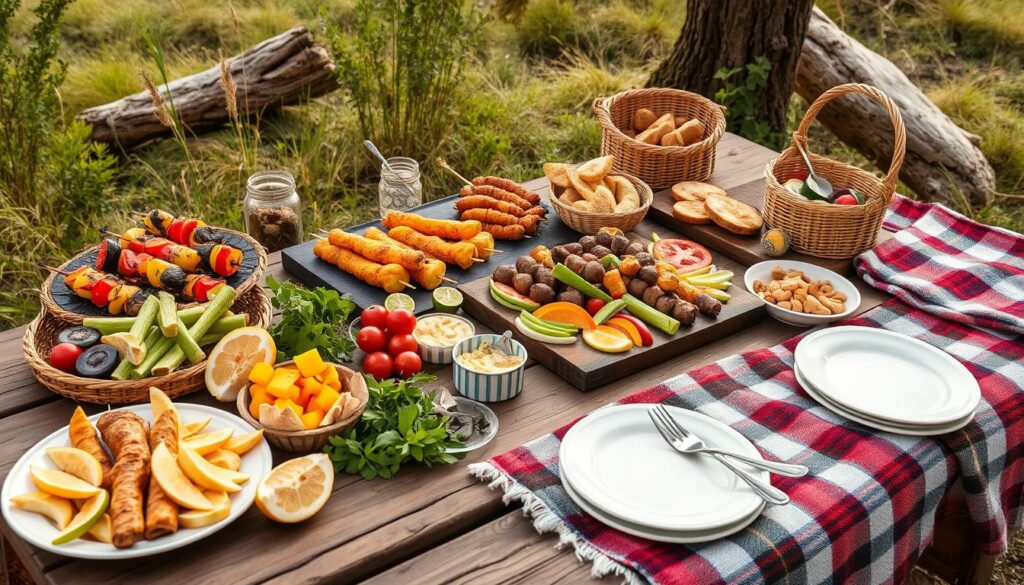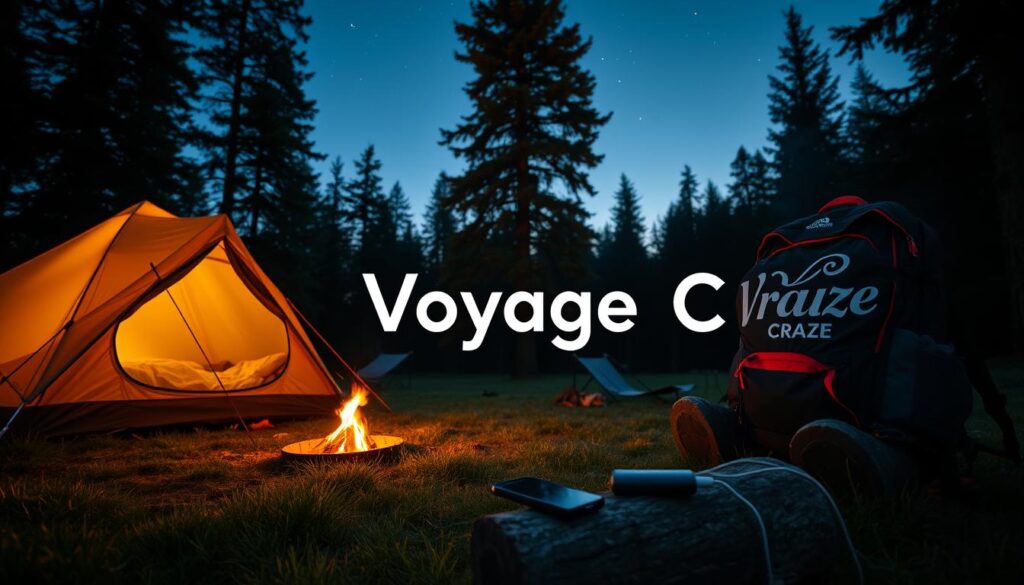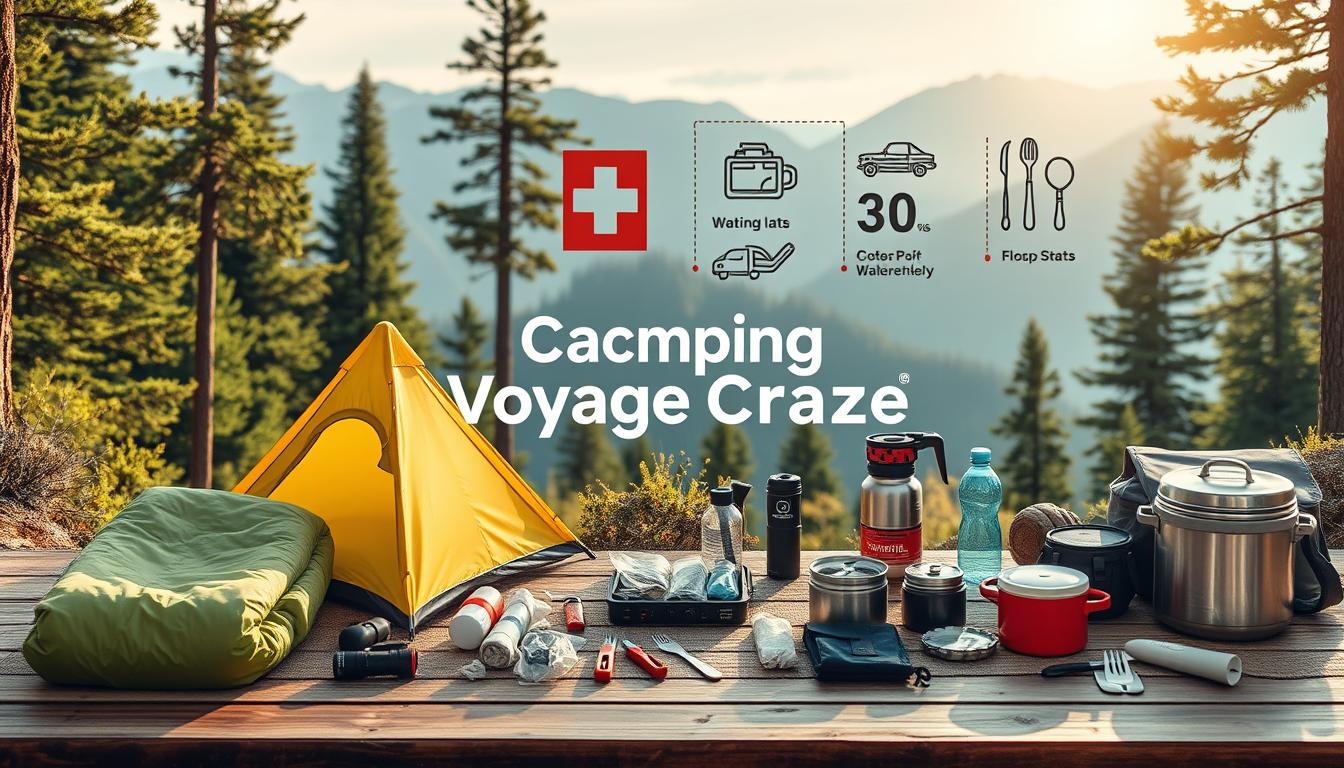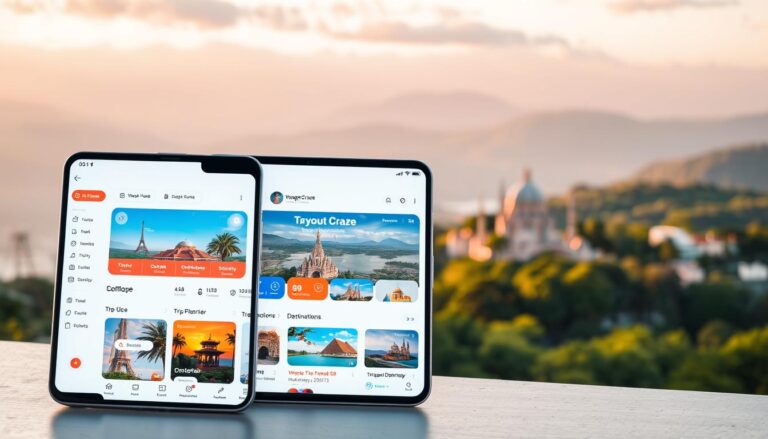When you start planning your first camping trip, it’s key to cover the basics. This includes making a camping essentials checklist and a packing list. Summer is the busiest time for camping, with many spots full by July and August. So, it’s important to plan early.
About 60% of new campers feel too stressed about planning. But, with the right tips, you can make your trip fun and worry-free.
Think about what kind of camping you’ll do, how many people are coming, and the weather. A good shelter should be easy to set up, keep you dry, warm, and safe. Making a packing list helps you stay organized and ensures you have all the gear you need.
By planning well, you can have a camping trip you’ll always remember. Don’t forget to make a camping essentials checklist and a packing list. This way, you’ll be ready for a great adventure.
Key Takeaways
- Start with the basics, including creating a camping essentials checklist and a camping trip packing list
- Consider the type of camping you’ll be doing, the number of people in your group, and the weather conditions you’ll be facing
- A good camping shelter should be simple to use, able to keep you dry, warm, and safe
- Approximately 60% of first-time campers feel overwhelmed by the planning process, but with the right guidance, you can ensure a stress-free and enjoyable experience
- Creating a camping trip packing list will help you stay organized and ensure you don’t forget any essential gear
- Include a camping essentials checklist and a camping trip packing list in your preparations to ensure you have everything you need for a successful trip
Choosing the Right Destination
Choosing the right camping spot is key for a great trip. Beginners should think about how far it is from home, the type of camping, and activities they want to do. Beginner camping tips often suggest starting with local sites to get a feel for camping.
Researching local campsites and knowing park rules is important. This helps you make a good choice.
Some top spots for beginners include national parks like Olympic National Park or Joshua Tree National Park. These parks have different camping options, from backcountry to developed sites with amenities. But, popular spots can get crowded, so book ahead and check what’s available.
Researching Local Campgrounds
- Check websites like Reserve America and Hipcamp for reviews and weather conditions
- Consider the accessibility of the campsite, including distance from parking and amenities
- Look for campsites that cater to your group size and type of camping
Understanding Park Rules and Regulations
Every park has its own rules, so it’s important to know them before you go. This includes rules on camping permits, fire use, and wildlife safety. Following these rules helps protect nature and ensures a safe, fun trip.
Selecting Your Camping Style
Choosing the right camping style is key to a great camping trip. Whether you’re new to camping or have been doing it for years, picking between tent, RV, or backcountry camping can be tough. Camping gear for beginners is very important. A good tent and sleeping bag can really improve your camping experience.
Thinking about camping food ideas is also important. Planning your meals ahead of time can make cooking easier. Simple foods like oatmeal for breakfast or sandwiches for lunch are good choices. It’s also smart to keep snacks like trail mix and granola bars handy to keep your energy up.
Tent Camping vs. RV Camping
Tent camping lets you connect more with nature. RV camping, however, offers more comfort and amenities but costs more. Think about your budget, how many people are with you, and what activities you want to do to decide.
Backcountry Camping Considerations
Backcountry camping is for those who want a peaceful, remote spot. It requires more planning and experience. Always research the area, check the weather, and pack right. Bring a map, compass, and first aid kit, and tell someone your plans.
Group Camping vs. Solo Camping
Group camping is fun and social but needs more planning. Solo camping gives you more freedom and quiet. Think about what you like and need when choosing, and always stay safe.
Essential Gear for Beginners
When you go camping, having the right gear is key for a good time. A well-thought-out camping essentials checklist can really help. As a beginner, it’s smart to buy quality gear that will last for many adventures.
A camping trip packing list should have the basics like a tent, sleeping bag, and cooking stuff. Think about the kind of camping you’ll do and the weather too. For cold weather, pack a warm sleeping bag and a strong tent that can handle wind and rain.
Here are some must-haves for your camping essentials checklist:
- Tent and sleeping bag
- Cooking equipment and utensils
- Flashlight and extra batteries
- First aid kit
- Water bottle and water purification tablets
Check the weather forecast before you go and pack for it. It’s smart to have a camping trip packing list to avoid forgetting anything. With the right gear and some planning, you’re set for a fun and memorable camping trip.
Planning Your Camping Menu
Planning your camping menu is key to a great camping trip. As a beginner, it’s important to pick easy recipes. This way, you can enjoy your time outdoors without stress.
First, think about what you’ll cook and what you’ll need to cook it. Also, consider how to store and pack your food. Some tasty options include fajitas, burgers, and one-pot meals. Don’t forget snacks like raw almonds and dried fruit to keep you energized.
Here are some beginner camping tips for planning your menu:
- Make a meal plan and stick to it
- Pack a variety of food options, including main dishes and sides
- Consider using a spreadsheet tool to organize your menu and grocery list
- Don’t forget to pack plenty of water and stay hydrated throughout your trip

By following these tips and considering these food ideas, you’ll have a great camping trip. Always follow food safety rules and clean up after yourself. This way, you’ll leave the campsite as you found it.
| Meal | Ingredients | Cooking Method |
|---|---|---|
| Fajitas | Beef, peppers, onions, tortillas | Grilling |
| Burgers | Beef, buns, cheese, lettuce, tomato | Grilling |
Booking Your Campsite
Booking a campsite involves several key factors. These include the type of campsite, amenities, and rates. For beginners, picking a campsite that’s both comfortable and safe is crucial. Best campsites for beginners usually have electricity, bathrooms, and clean water.
Understanding reservation systems is vital for a smooth booking. Beginners should avoid first-come-first-served sites. Instead, opt for campsites with reservation systems, like those on Stateparks.com or Recreation.gov.
When picking a campsite, consider a few things:
- Amenities: Look for campsites with amenities such as electricity, bathroom facilities, and potable water.
- Location: Choose a campsite that is close to your desired destination and offers easy access to amenities.
- Rates: Compare rates among different campsites to find the best value for your money.
Always follow camping safety tips. This includes respecting the environment and following park rules. By choosing the right campsite and following safety tips, you can have a fun and memorable camping experience.
Packing Clothes and Personal Items
When you’re getting ready for a camping trip, it’s key to pack the right clothes and personal items. A good camping essentials checklist can really help. Think about the clothes you’ll need, the personal care products you’ll use, and how to pack everything neatly.
A camping trip packing list should have both essentials and comforts. Make sure to pack for different weather conditions. It’s smart to bring at least two changes of clothes for each day because of dirt, sweat, and messy food.
Here are some must-haves for your camping trip packing list:
- Clothing for different weather
- Personal care items like toothbrush, toothpaste, and biodegradable soap
- Packing tools, such as cubes and kits
Always check the weather forecast before you go and pack for it. With a well-thought-out camping essentials checklist and a detailed camping trip packing list, you’ll be ready for a great camping adventure.
| Item | Quantity | Packing Tips |
|---|---|---|
| Clothing | 2-3 changes | Roll clothes to save space |
| Personal care products | 1 set | Use travel-sized products |
| Packing organizers | 1 set | Use packing cubes and toiletry kits |
Setting Up Camp
When you’re setting up camp, it’s key to follow beginner camping tips for a safe and fun time. Make sure your tent is on a level spot to avoid it becoming uneven or even falling over. Also, be careful with tent stakes as they can be a hazard if not secured right.
Keeping your campsite organized is also important for safety. Make sure to keep your area clean and tidy. Also, store food and trash correctly to avoid attracting animals. Building a fire safely is another must, so always follow local fire safety rules and regulations.
Some key things to remember when setting up camp include:
- Choose a level spot for your tent
- Be mindful of tent stakes
- Keep a clean and tidy campsite
- Store food and trash properly
- Follow local fire safety guidelines and regulations
By following these beginner camping tips and camping safety tips, you can have a safe and fun camping experience. Always put safety first for yourself and those around you. If you’re unsure about anything, don’t hesitate to ask for help.
| Item | Importance |
|---|---|
| Tent | High |
| Sleeping Bag | High |
| First Aid Kit | High |
| Flashlight | Medium |
| Water Bottle | Medium |
Understanding Camping Safety
When you go camping, safety is the most important thing. As a beginner, knowing the dangers and how to avoid them is key. Camping safety tips help you get ready for anything that might happen. It’s important to research the area and plan ahead for a good camping trip.
Some important beginner camping tips include staying alert, keeping a safe distance from animals, and having a plan for emergencies. Always carry a first aid kit and know how to use it. These camping safety tips help you avoid accidents and have a great time camping.
It’s also smart to tell someone your camping plans and when you’ll be back. This way, if you’re late, someone knows where to find you. Taking these simple steps makes your camping trip safer and more fun.
Other key camping safety tips include:
- Keeping a fire extinguisher nearby
- Storing food and trash properly to avoid attracting wildlife
- Being aware of potential hazards such as steep cliffs or fast-moving water
By following these beginner camping tips and staying alert, you can have a safe and fun camping trip. Always put safety first and take steps to avoid accidents.
Navigating the Outdoors
When you head out into nature, it’s key to have the right tools for navigation. A camping essentials checklist should list a map, compass, and GPS or a mobile app. These help you stay on course and find your way back to camp. It’s also important to know how to read trail markers and signs for safe travel.
A camping trip packing list should include extra batteries, a first aid kit, and a repair kit for your gear. Being over-prepared is better than being under-prepared for outdoor adventures. By planning and making a checklist, you can have a great camping trip.
Some key things to consider when navigating the outdoors include:
- Using maps and compasses to stay on track
- Utilizing GPS and mobile navigation apps for added convenience
- Recognizing trail markers and signs to avoid getting lost
By following these tips and being prepared, you can navigate the outdoors with confidence. Enjoy the beauty of nature. Always plan ahead, make a checklist, and stay safe on your camping trip.
| Navigation Tool | Description |
|---|---|
| Map | A physical or digital map of the area |
| Compass | A device used to determine direction |
| GPS Device or Mobile Navigation App | A device or app used to track location and navigate |
Staying Connected
When you go camping, it’s key to stay in touch. This means looking at cell service, emergency devices, and offline tools. These steps help ensure a safe and fun trip.
For camping safety tips, check the cell service at your campsite. Some spots have little to no signal. So, you might need devices like two-way radios or satellite phones.

Also, having offline tools like maps and compasses is smart. They help you find your way and stay safe. By following these beginner camping tips and camping safety tips, you can enjoy your adventure more.
Here are some important tips for staying connected while camping:
- Researching cell service availability at the campsite
- Investing in emergency communication devices
- Setting up offline resources, such as maps and compasses
Environmental Considerations
When planning a camping trip, think about how your actions affect the environment. A good camping essentials checklist can help reduce your impact. Include items like reusable water bottles and biodegradable soap to cut down on waste and save resources.
Leave No Trace Principles
Leave no trace principles guide campers to lessen their environmental impact. These include proper waste disposal, respecting wildlife, and conserving resources. By adhering to these principles, you help keep the outdoors beautiful for others to enjoy.
Respecting Wildlife and Ecosystems
It’s vital to respect wildlife and ecosystems when camping. Keep a safe distance from animals, don’t feed them, and don’t disrupt their homes. Also, be careful not to camp on soft soil or fragile plants.
Conserving Resources While Camping
Conserving resources is key to reducing your environmental footprint while camping. Use biodegradable soap and stay 200 feet away from water when washing up. Also, bury human waste in holes that are 6-8 inches deep. A well-thought-out camping trip packing list ensures you have what you need to conserve resources.
By considering these environmental tips, you can enjoy a safe and eco-friendly camping trip.
| Environmental Consideration | Tips |
|---|---|
| Leave No Trace Principles | Dispose of waste properly, respect wildlife, and conserve resources |
| Respecting Wildlife and Ecosystems | Keep a safe distance from wildlife, avoid feeding them, and avoid disturbing their habitats |
| Conserving Resources | Use biodegradable soap, stay at least 200 feet away from water when using soap or toothpaste, and bury human waste in holes that are 6-8 inches deep |
Gear Maintenance and Care
Keeping your camping gear in top shape is key for a safe and fun camping trip. This means cleaning your equipment, fixing common issues, and storing it right. For camping gear for beginners, knowing how to maintain your gear is crucial. It helps your equipment last longer.
Cleaning Your Camping Equipment
Cleaning your camping gear is essential to keep it working well. Make sure you have cleaning products and tools on your camping essentials checklist. Cleaning regularly can make your gear last about 25% longer.
Repairing Common Gear Problems
Issues like torn fabric or broken zippers can be fixed with the right tools and skills. It’s important to fix these problems quickly to avoid more damage.
Storing Gear for Longevity
Storing your camping gear correctly can make it last longer. Keep it in a dry, cool spot, away from sunlight. Following these tips will help your gear stay in great shape for your next adventure.
Preparing for Weather Changes
When camping, being ready for weather changes is key for a safe and fun trip. As a beginner, always check the weather forecast before you go. This helps you pack the right stuff and get ready for any weather.
Some important beginner camping tips for weather changes include wearing layers, carrying a waterproof jacket, and having an emergency plan. It’s also vital to keep up with the weather and adjust your plans if needed.
Here are some camping safety tips for weather changes:
- Check the weather forecast regularly
- Pack layers and waterproof gear
- Have a plan in place in case of an emergency
- Stay informed about weather conditions and be prepared to adapt your plans
By following these tips and being ready for weather changes, you can ensure a safe and fun camping trip. Always remember to follow camping safety tips and be ready for anything.
Post-Camping Cleanup
After a fun camping trip, it’s key to clean up and think about your adventure. A camping essentials checklist helps you remember to pack up all your stuff. This way, you leave the campsite just like you found it.
Having a good camping trip packing list keeps your gear organized. It makes sure you don’t forget anything. With a few simple steps, cleaning up after camping can be easy. You’ll be ready for your next trip in no time.
- Packing up all gear and trash
- Leaving the campsite in the same condition as you found it
- Cleaning and maintaining your gear to extend its lifespan
By following these tips and using a camping essentials checklist and camping trip packing list, you can make cleanup efficient. You’ll be all set for your next adventure.
| Task | Importance |
|---|---|
| Packing up all gear and trash | High |
| Leaving the campsite in the same condition as you found it | High |
| Cleaning and maintaining your gear | Medium |
Tips for Future Camping Trips
After your first camping trip, think about how to make the next one better. Keeping a camping journal is a great idea. It helps you remember what worked and what didn’t.
Building a checklist is also key. It ensures you don’t forget important items. This can make your next trip less stressful and more enjoyable.
Sharing your camping stories and tips with others is also beneficial. It helps them plan better and gives you new ideas for your next trip.
Improving Your Camping Experience
To make your camping trips better, focus on safety. Understand what your campsite offers and research the area before you go. This makes a big difference, with 70% of campers saying it improves their experience.
By planning ahead, keeping a journal, and making a checklist, you’ll have amazing camping experiences. You’ll be ready for anything the outdoors throws your way.
Sharing Knowledge and Experiences
Sharing your camping stories and tips helps others plan better. It also gives you new ideas for your next trip. By following these tips, you’ll enjoy your camping trips more and make the most of your time outdoors.







